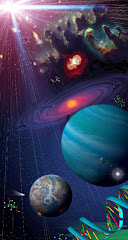There are a number of labs throughout the US and around the world trying to understand just how life originated in the universe and/or on planet Earth. A number of these labs approach the question by attempting to synthesize life themselves, by using software, hardware, or chemical processes. Obviously, creating a computer program that is able to simulate the patterns of stripes on a zebra doesn't lead directly to the conclusion that mother nature is actually a computer programmer, but may shed some light on possible mechanisms for the creation of biological form and how to search for those mechanisms.
As mentioned above, there are three different types of methods used in the field of artificial life. Simulations using computer programs are referred to as "soft" artificial life, those using robotic applications are referred to as "hard" artificial life, while those using biochemistry are referred to as "wet" artificial life. While computer simulations and robots are neat-looking, the creation of synthetic life, or primitive-looking cells that could represent the ancestors of biological life, is the holy grail of Astrobiology, as well as a multitude of fields in the Life Sciences.

 One of the most prolific scientists intent on creating synthetic life is Dr. J. Craig Venter. The man's actually got a whole institute named after him. Earlier this year, the Science section of wired.com reported on findings published in the magazine Science regarding the creation of the "first man-made genome" by Venter and colleagues. Essentially, yeast was used to "stitch together four long strands of DNA into the genome of a bacterium". This research, though, isn't focused so much on the origin of life but rather on how humans can control the output of synthetic organisms to their own advantage. Think indentured bacteria spewing forth biofuels.
One of the most prolific scientists intent on creating synthetic life is Dr. J. Craig Venter. The man's actually got a whole institute named after him. Earlier this year, the Science section of wired.com reported on findings published in the magazine Science regarding the creation of the "first man-made genome" by Venter and colleagues. Essentially, yeast was used to "stitch together four long strands of DNA into the genome of a bacterium". This research, though, isn't focused so much on the origin of life but rather on how humans can control the output of synthetic organisms to their own advantage. Think indentured bacteria spewing forth biofuels.



